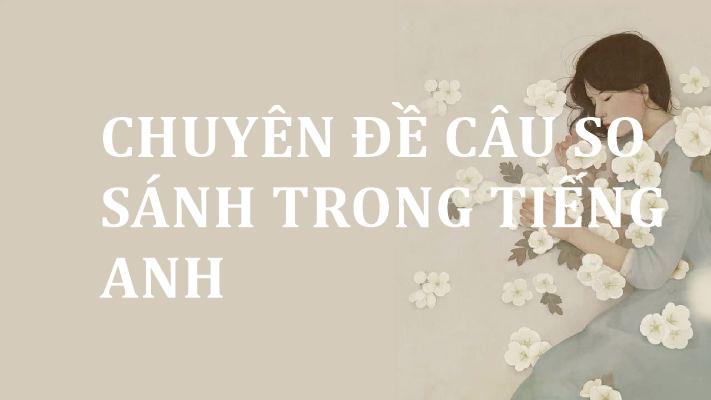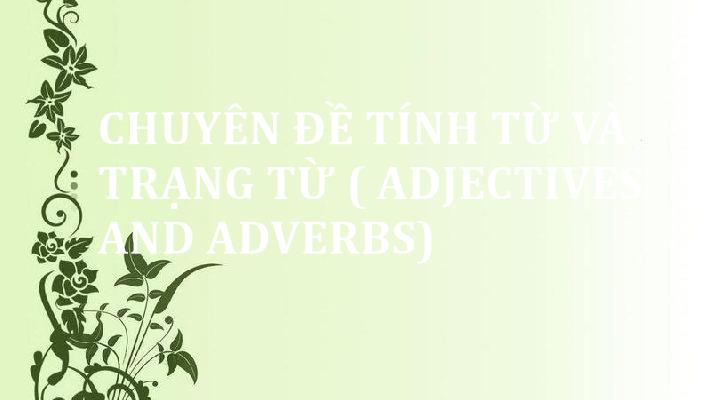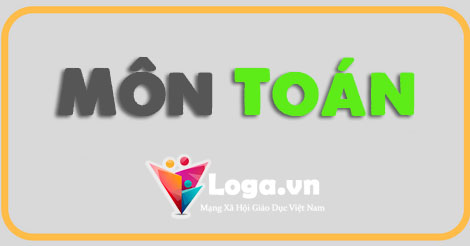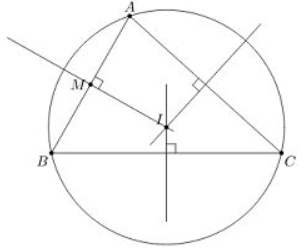Subject- verb agreement - Determiners
I) Quy tắc chung về sự hòa hợp giữa chủ ngữ và động từ
Thông thường, chủ ngữ được chia làm 2 nhóm
S1 (I/ we/ you/ they/ danh từ đếm được số nhiều)
S2 (he/ she/ it/ danh từ đếm được số ít/ danh từ không đếm được)
→ Khi chia động từ, ngoài việc xác định thì của động từ, ta còn phải căn cứ vào chủ ngữ xem là S1 hay S2. Nếu là S1 thì động từ chia theo số nhiều. Nếu là S2 thì động từ chia theo số ít (như đã học ở các thì)
Eg: We (be) the world.
are
Marry (like) cats.
likes
Milk (be) my favorite drinks.
is
My children (learn) English very well.
learn
II) Những trường hợp cần lưu ý
1) khi S là những danh từ được theo sau bởi:
along with/ with/ together with: cùng với
as well as: cũng như
accompanied by: được theo sau bởi
like: cũng như
in addition to: thêm vào
including: bao gồm
→ V chia theo N đứng trước những từ này
Eg: The cow, as well as the horses, is grazing glass.
The leader with all his men, was killed.
The children along with their parents, are coming to the party.
2) Khi S là những N được theo sau bởi:
besides/ apart from: ngoài
other than/ except for/ but: trừ
unlike: không giống như
→ V chia theo danh từ đứng trước
Eg: All the books other than the blue one are very interesting.
Tom, unlike his parents, is very intelligent.
3) Khi S là N1 of N2 → V chia theo N1
Eg: The picture of the soldiers brings back many memories.
The effects of smoking are very harmful.
4) Cấu trúc there + be + …
There + be + N đếm được số nhiều/ số ít/ danh từ không đếm được
- be ít hay nhiều tùy thuộc vào N đằng sau.
There is + (a/ an/ one) + N
There are (number) + Ns
Eg: There is a bag on the table.
There are two bags on the table.
Chú ý: There is a book, four pens on the table.
But There are four books, one pen on the table.
5) Khi S là N số nhiều chỉ 1 khoảng thời gian, 1 số tiền, 1 khoảng cách, 1 trọng lượng... thì V chia theo số ít
Eg: A thousand dollars is a large sum of money.
Twenty years is a long period of time.
*) More than one + N số ít -> V chia theo số ít
Eg: More than one person knows that news.
*) nhưng: A thousand dollars have just been put in my account.
(coi là số nhiều)
6) Khi S là những N tập hợp, V chia theo số ít hoặc số nhiều là tùy thuộc vào ý của câu:
- số ít nếu coi N tập hợp đó là 1 đơn vị
- số nhiều nếu ý nói đến các thành viên, các bộ phận của tập hợp đó.
*) Những N tập hợp thông dụng là: audience, army, class, crowd, committee, company, crew, club, choir, firm, flock, family, group, government, jury, orchestra, school, staff, team, union…
Eg: My family has 4 members.
My family live in London.
*) một số N tập hợp khác luôn chia số nhiều: people, police, clergy, poultry…
Eg: The police haven’t made any arrests.
Eg2: Poultry is expensive this Christmas. (món thịt gia cầm)
Poultry are fed twice a day. (loài gia cầm)
7) Một số N tận cùng là s nhưng có nghĩa số ít, V chia ở số ít
*) các môn học có tận cùng là -ics
physics ethics
mathematics optics
economics politics
phonetics civics
linguistics genetics
Eg: What is economics?
Mathematics is my favorite subject.
*) những N số nhiều nhưng là tiêu đề sách cũng chia ở số ít.
Eg: Gulliver’s travels is an interesting novel.
*) Một số N khác: news, measles, darts ...
-> V chia theo S số ít
Eg: Measles is a common disease among children.
*) Một số N tận cùng là s vừa là số ít, vừa là số nhiều.
statistics - sự thống kê, môn thống kê ( số ít)
- các dữ kiện thống kê ( số nhiều)
means - phương tiện, cách ( số ít)
- các phương tiện, cách ( số nhiều)
tactics - chiến thuật chung chung ( số ít)
- các chiến thuật cụ thể ( số nhiều)
cheeses: pho mát nói chung: không đếm được → số ít
Newzealand cheeses: những loại pho mát cụ thể: đếm được → số nhiều
Eg: Language is a means of communication.
All possible means have been tried.
*) những N chỉ cặp/ đôi
a pair of shoes → số ít
the shoes → số nhiều
Eg: My shoes are expensive.
This pair of shoes is expensive.
a pair of scissors >< the scissors
a pair of trousers >< these trousers
Tương tự với a couple of
8) The + adj → N số nhiều → V chia theo số nhiều
The poor, the rich, the deaf, the injured…
Eg: The injured were taken to hospital.
9) Những cụm N hoặc đại từ định lượng với nghĩa là nhiều hoặc ít
Nhiều:
• a number of + N đếm được số nhiều → ý (+)
• many + N đếm được số nhiều → thường dùng ý (-), (?)
• an amount of + N không đếm được → trong câu (+)
• much + N không đếm được → thường trong câu (-), (?)
• a lot of/ lots of + cả N không đếm được và N đếm được số nhiều → câu (+)
• (a) plenty of + cả N đếm được số nhiều và N không đếm được → câu (+)
• a great deal of + N không đếm được → câu (+)
*) chỉ dùng many hoặc much sau 2 từ so/ too mặc dù câu (+)
Eg: There are too many books on the table.
There is so much water in the bottle.
There are a number of students nowadays.
a lot of/ lots of
a plenty of
many ( ít dùng)
Eg: I don’t have much money.
Ít:
a few + N đếm được số nhiều → ý (+)
a little + N không đếm được → ý (+)
few/ little → ý (-) không có not
Eg: Can you lend me some money?
→ Sorry, I have little (money)
→ Ok! I’ll lend you because I have a little (money)
Eg2: I want to buy some more books because I have few (books)
*) nhưng chỉ dùng a few/ a little sau 2 từ just/ only ( chỉ)
Eg: Only a few people came to the party.
+ not many/ much → hàm ý (-) → thay bằng few/ little
some/ several → ý (+) → thay bằng a few/ a little
Eg: There are not many apples in the basket.
→ There are few apples in the basket.
+ Tuy nhiên , the number of + N đếm được số nhiều → chia ở số ít ( nói về 1 con số, 1 lượng)
Eg: The number of students who take part in the meeting is increasing.
>< A number of students take part in volunteer work.
10) Khi S là những đại từ bất định → chia số ít ( chủ yếu)
some- , any-, no-, every-
+) some/ any + N đếm được số nhiều → chia số nhiều
N không đếm được → chia số ít
some → câu (+)
any → câu (-)/ (?)
Eg: (+) There are some books on the table.
(-) There are not any books on the table.
Eg2: (+) There is some water in the bottle.
(?) Is there any water in the bottle?
+) any + N đếm được số ít để nhấn mạnh “bất cứ” → số ít
Eg: Any country has the right for freedom and independence.
+) no + N đếm được số nhiều → chia số nhiều
N đếm được số ít ( nhấn mạnh)
N không đếm được
→ chia số ít.
Eg: No house in the city is older than mine.
No water has been supplied for this region.
No pens are sold today.
+) every + N đếm được số ít → V chia số ít ( mỗi, mọi → hàm ý tất cả)
→ dùng cho câu (+)/ (?)
Eg: Every student has to do his/ her homework.
Chú ý: every two years/ every four years.
*) Notes:
some/ any → có thể đứng độc lập một mình hoặc đi kèm N
no/ every → luôn phải có N đằng sau.
Eg: Would you like some tea?
→ Yes, give me some.
+) some/ any/ no/ every → trong các đại từ bất định chỉ người/ vật
some one/ somebody/ anyone…
something/ anything…
some → dùng cho câu (+)
any → dùng cho câu (-)/(?)/ nhấn mạnh
no → dùng cho câu (+) ý (-)
every → dùng cho câu (+)/(?)
→ là S, V luôn chia số ít
Eg: There is someone at the door.
There isn’t any one at the door.
Is there anyone at the door?
→ Yes, there is someone at the door.
→ No, there isn’t anyone at the door.
→ No, there is nobody at the door.
11) Một số đại từ khác
All + N đếm được số nhiều
N không đếm được
Ø
→ chưa xác định
+ of + N đếm được số nhiều → có thể bỏ of
N không đếm được → có thể bỏ of
Đại từ tân ngữ ( us, them)
→ xác định
Chú ý:
- không nói all what mà nói all + mệnh đề
eg: All I have said is true.
= What I have said is true.
- không nói all we/ all of we → all of us/ we all → làm S
- không nói all us → all of us/ us all → làm tân ngữ
- V chia tùy theo N đếm được hay N không đếm được
Eg: All children have their right to attend school.
All water is polluted.
All was quiet in the dark.
Eg2: All (of) my students learn E well.
All (of) his money has been stolen.
Eg3: All of us are beautiful and intelligent.
We all are beautiful and intelligent.
Eg4: We love all of them.
We love them all.
+) all night/ all day ( suốt đêm, suốt ngày)
all (of) the book: cả quyển sách
eg: All (of) the book is written in English.
Most + N đếm được số nhiều
N không đếm được
→ chưa xác định
+ of + N đếm được số nhiều
N không đếm được
Đại từ tân ngữ (us, them, you)
→ xác định
* Trường hợp này không bỏ of và V chia tùy thuộc vào N đằng sau.
Eg: Most young people like pop music.
Most air contains oxygen.
Eg2: Most of my students are girls.
Most of my money has been put in my account.
Most of them were killed by terrorists.
→ tương tự cách dùng đối với 1 số từ khác: some, many, half, several,…
+ N chưa xác định
+ of + N xác định
Both + (of) + N đếm được số nhiều (xác định)
+ of + Đại từ tân ngữ (us, them..)
S: both of us/ we both
O: both of us/ us both
Eg: Both (of) these boys are intelligent.
Both of them love each other very much.
They both love each other very much.
I like both of them.
I like them both.
Chú ý: liên từ both…and (cả….và/ vừa….vừa)
→ V cũng luôn chia số nhiều.
Either + N đếm được số ít → người, vật này hoặc kia
+ of + N đếm được số nhiều → 1 trong 2
+ of + Đại từ tân ngữ → 1 trong 2
Eg: You can come here on Tuesday or Wednesday.
Either day is ok.
Eg2: Either of the children is capable of looking after the baby.
Either of them knows the answer.
Chú ý:
Cụm liên từ: either…or (hoặc này hoặc kia)
→ V chia theo S2 gần nó hơn
Eg: Either he or his friends keep that ball.
Neither + N đếm được số ít (không phải người, vật này cũng không phải người, vật kia)
→ V chia số ít
+ of + N đếm được số nhiều
+ of + Đại từ tân ngữ (us, them)
→ V chia số ít hoặc nhiều đều được.
neither….nor…: không này…cũng chẳng kia…
→ V chia theo S2 gần nó hơn
Eg: Can you come on Monday or Tuesday?
I’m afraid neither day is possible.
Eg2: Neither of my sisters is/are married.
Neither of them can understand me.
Chú ý:
- neither or either có thể đứng độc lập khi câu trước đã đề cập đến người hoặc vật.
eg: I’ve seen these books. Neither is good. So I bought neither.
I’ve seen the two films. Either is interesting. So I like either.
• not…either = neither
eg: I didn’t buy either of them.
= I bought neither of them.
None - có thể đứng độc lập = No + N (ít/ nhiều) đã được đề cập trước đó
+ of + N đếm được số nhiều xác định
+ of + đại từ tân ngữ
Eg: He asked me for some food but I had none ( = no food) at home.
Eg2: I went to the library to look for some books written by Shakespeare but I found none/ but none was found there.
Eg3: None of us lives/ live near my parents.
None of my students has/have failed the exam.
Not one of + N đếm được số nhiều xác định
+ đại từ tân ngữ
= none of nhưng V chia ở số ít
Eg: Not one of my books is new.
Not one of them likes swimming.
Every/ Each + N đếm được số ít hoặc N trần → V chia số ít
Eg: Every room has a table.
Each room has a table.
+) every: hàm ý tất cả, không đứng độc lập, không đi với of, ám chỉ số lượng từ 3 trở lên
+) each: hàm ý mỗi một người hoặc vật trong nhóm , có thể đứng độc lập (nếu N đã được đề cập trước đó), có thể cộng of
+ N đếm được số nhiều
Đại từ tân ngữ
Ám chỉ số lượng từ 2 trở lên
Eg: I go for a walk everyday.
Each day seems to pass very slowly.
Each of the new six classrooms has its own air-conditioner.
( không nói every of)
Each of us / We each needs health and love.
They gave each of us/ us each an interesting English book.
Every one = each person ( mỗi người)
Everyone ( mọi người, là đại từ bất định)
Every one + of …
Everyone không đi với of
Eg: Everyone feels happy about the result.
Every one of the boys likes football.
= Each of the boys likes football.
Each other / One another :
+ N đếm được số nhiều và N không đếm được
Có thể dùng sở hữu cách cho 2 từ trên
Eg: My students borrowed one another’s notebooks to share their information.
The two girls share each other’s interests.
John and Mary love each other/ one another.
*) 2 đại từ trên chỉ làm tân ngữ
Bài tập:
Bài 1: Bài tập sự hòa hợp giữa chủ ngữ và động từ (Chọn đáp án đúng nhất)
1. A large number of students in this school … English quite fluently.
A. speaks B. is speaking C. has spoken D. speak
2. Five dollars … all I have on me.
A. are B. is C. will be D. have
3. John, along with twenty friends, … planning a party.
A. are B. is C. has been D. have been
4. Mathematics … the science of quantity.
A. was B. are C. is D. were
5. Either John or his wife … breakfast each morning.
A. make B. is making C. makes D. made
6. Measles … cured without much difficulty nowadays.
A. is B. are C. will be D. have
7. The use of credit cards in place of cast … increased rapidly in recent years.
A. have been B. has been C. has D. have
8. The number of the months in a year … twelve.
A. was B. were C. are is
9. Everybody who … a fever must go home at once.
A. has B. have C. is having D. are having
10. The pair of the pliers … on the table.
A. was B. were C. put D. puts
Bài 2: Bài tập về từ hạn định (Chọn đáp án đúng nhất)
1. The young man and the young woman paid … attention to the writer.
A. none B. any C. not any D. no
2. Mr. Scott has a garage in Silbury. His … garage is in Pinhurst.
A. another B. other C. else D. different
3. Joe’s garden is the best in the town. It’s the best … them all.
A. in B. for C. of D. by
4. Most of the young people will be there. … the young people will be there.
A. A lot B. Nearly all C. Some D. Many
5. A great many good were sent. There were …
A. quite a few B. quite a little C. not too many D. very much
6. Nowadays … women get university degrees.
A. either B. every C. both D. many
7. I have … books of my own.
A. no B. not C. any D. much
8. The strike will last for a week. That’s what … people believe.
A. most of B. the most of C. the more D. most
9. I am one of the few people left. So there …
A. are none left B. is one left C. are some left D. are lot left
10. I speak a few words of French. I don’t know … French.
A. many B. much C. plenty of D. a little
Đáp án:
Bài 1:
1. D 6. A
2. B 7. C
3. B 8. D
4. C 9. A
5. C 10. A
Bài 2:
1. D 6. D
2. A 7. A
3. C 8. D
4. B 9. C
5. A 10. B







